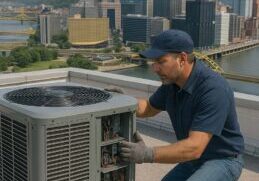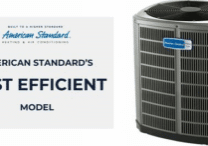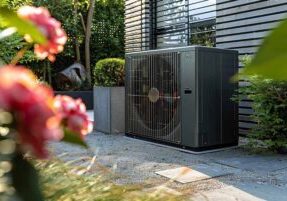Nothing disrupts daily life like an unexpected breakdown of your home’s heating or cooling system. That moment when you realize your HVAC unit has called it quits can be both frustrating and financially daunting. It’s an inconvenient situation many have faced. However, amidst the chaos of system failures, there’s a silver lining. It’s the opportunity not just to replace your unit, but to upgrade to a more efficient, cost-effective solution. Even better, you can earn tax incentives by choosing an energy-efficient HVAC system.
In this article, we’ll summarize the Federal Tax Credits specific for HVAC Systems, unravel the benefits that come with claiming this incentive, and how to take the next step in making this eco-friendly investment a reality.
What is the federal Inflation Reduction Act?
The Inflation Reduction Act, signed by President Biden on August 16, 2022, stands as the most significant investment in clean energy and climate action in U.S. history. As part of this transformative law, tax credit opportunities have been expanded and are available to any homeowner making energy-efficient home upgrades.
What are energy tax credits?
Energy tax credits are the government’s way of incentivizing tax payers to switch their energy sources from fossil fuels to more sustainable resources. Since the upfront costs are a costly endeavor for many, the credits aim to reduce the initial expense of acquiring the HVAC equipment.
What are the updated energy efficient standards and why are they important to know?
In 2017, the Department of Energy issued a new set of energy efficient standards for heating and cooling equipment that went into effect January 2023. Since the qualification for tax credits depends on the efficiency of these systems, it’s important to be aware of the new ratings, what they mean, and how they affect you.
- SEER2 (Seasonal Energy Efficiency Ratio 2):
Each HVAC system comes with a SEER rating. A higher rating signifies greater energy efficiency in your system. This rating is determined by dividing the cooling output by the input wattage during the three summer months. - EER2 (Energy Efficiency Ratio 2):
The EER2 rating serves as the simplest way to measure AC efficiency, calculated by dividing the air conditioning’s cooling capacity by the maximum electric input under static test conditions. - HSPF2 (Heating Seasonal Performance Factor 2):
The HSPF rating measures heat pumps’ heating efficiency, showing how effectively they warm your home throughout the season. This rating is calculated by dividing the heating output generated during the season by the electricity used to produce it. - AFUE (Annual Fuel Utilization Efficiency):
The ratio of a gas furnace or boiler’s annual heat output to its overall annual consumption of fossil fuel energy.
What HVAC tax incentives are available for homeowners?
Enhanced tax credits through the Energy Efficient Home Improvement initiative are accessible for homeowners investing in energy-efficient systems, including central air conditioning systems, boilers, furnaces, air-source heat pumps, and biomass stoves that meet high-efficiency standards.
These increased credits are significantly better than previous offerings for energy-efficient home improvements related to HVAC in 2022 and earlier. When coupled with the energy savings, these credits provide an excellent opportunity to reduce expenses on HVAC upgrades and utility bills while supporting the transition to cleaner energy.
Tax credits for air-source heat pumps
Ducted air-source heat pumps are a highly efficient way to heat and cool your home. By taking heat from outside into your home in the winter, and pulling heat out of your home in the summer, it can perform year round for optimal comfort.
Starting in 2023 and extended to December 2032, homeowners can qualify for a tax credit equal to 30% of their installation costs for air-source heat pumps, and up to $2,000 for qualifying heat pumps.
They must meet the following criteria to qualify:
- SEER2 rating greater than or equal to 16
- EER2 rating greater than or equal to 12
- HSPF2 rating greater than or equal to 9
Learn more about Spurk HVAC’s air-source heat pumps services here.
Tax credits for central air conditioning
Needless to say, central air conditioners are a hot commodity in warmer regions of the county, efficiently cooling a home and cutting out humidity from the harsh outdoors. If you have a cooling system purchased or installed in 2023 or beyond, you will be eligible for the updated tax credit.
Split systems meeting a SEER2 rating of 16 or higher are eligible for a tax credit, and all Energy Star-certified packaged systems also qualify. Central air conditioners can receive a tax credit of 30% of the project cost, capped at $600.
Learn more about Spurk HVAC’s central air conditioning services here.
Tax credits for boilers
Unlike electric heat pumps and air conditioner units, hot water boilers don’t follow a standardized rating scale; their efficiency is evaluated differently. The energy efficiency rating of a boiler-based system is determined by the fuel type it uses.
To qualify, a boiler must meet the following standards, depending on its type:
- Gas boilers must be Energy Star-certified and have an AFUE of 95% or greater.
- Eligible oil boilers must be rated by the manufacturer for use with fuel blends of at least 20% of the volume, consisting of biodiesel, renewable diesel or second-generation biofuel.
If a boiler meets these requirements, taxpayers are eligible for tax credits of 30% of the installation cost, not to exceed $600, as long as the unit is purchased and installed between January 1, 2023, and December 31, 2032.
Learn more about Spurk HVAC’s boiler services here.
Tax credits for gas & oil furnaces
Oil and gas furnaces have become popular for many reasons. Cost-effective, efficient, and long lasting reliability are just some of the many perks.
Homeowners can now get a tax credit equal to 30% of installation costs for highly efficient heating and cooling products, up to $600 for qualifying natural gas and oil furnaces.
The qualification is dependent on what type of fuel it uses:
- Gas furnaces must be Energy Star-certified and have an AFUE of 97% or greater.
- Oil furnaces must be Energy Star-certified and be approved for use with fuel composed of at least 20% biodiesel, renewable diesel, or second-generation biofuel when measured by volume.
Be sure to factor in the added expenses related to these fuel specifications when assessing the total cost of replacing your HVAC system. Furnaces meeting these criteria and installed from 2023 to 2032 qualify for credits amounting to 30% of the project cost, capped at $600.
Learn more about Spurk HVAC’s furnace services here.
Tax credits for biomass fuel stoves
Biomass fuel stoves are used to heat a home and heat water. Though they aren’t the most popular option, they have gained traction in colder environments for their ability to function while decreasing the carbon footprint as their fuel includes agricultural crops, wood, and plants.
To be eligible for increased tax credits, a biomass fuel stove should have a thermal efficiency rating of at least 75%. If it meets these criteria, a stove bought and installed from 2023 to 2032 can earn tax credits of 30% of the installation expenses and up to a maximum of $2,000.
How do I know which systems qualify?
To confirm if your HVAC system qualifies for a tax credit, the quickest and most reliable method is to check if it holds an Energy Star certification. Meeting this certification typically indicates eligibility for a tax credit.
While the minimum energy-efficiency standards are shifting, these new requirements won’t have an immediate impact on you. If your existing HVAC system doesn’t align with the new 2023 standards, you won’t be forced to upgrade immediately. However, opting to replace your current system sooner offers numerous advantages, such as significantly reduced energy bills and environmental benefits.
How do I apply for the federal HVAC tax credit?
Unfortunately, these credits aren’t immediately applied at time of purchase but are claimed on a IRS Form 5695 when you file your federal income taxes at the end of the year. When you file between 2023 and 2032, you’re eligible to claim a credit of 30% of the cost of your system’s installation. Depending on the type of system you invest in will influence the maximum dollar amount you can ultimately collect. When the time comes to claim, consult your tax professional to ensure you properly file and maximize your federal HVAC tax credit.
Take the first step in claiming the HVAC tax credit with Spurk HVAC
Whether you are considering new repair parts on your existing system, or looking to upgrade this winter, Spurk HVAC’s experienced technicians will take the time to answer your questions, recommend the best options for your home, and help secure all of the financial incentives that you qualify for. It’s hard to ignore all the environmental benefits and considerable cost savings that come with this revised program.
Contact us today to take the first step into a more energy-efficient and environmentally friendly future today.








